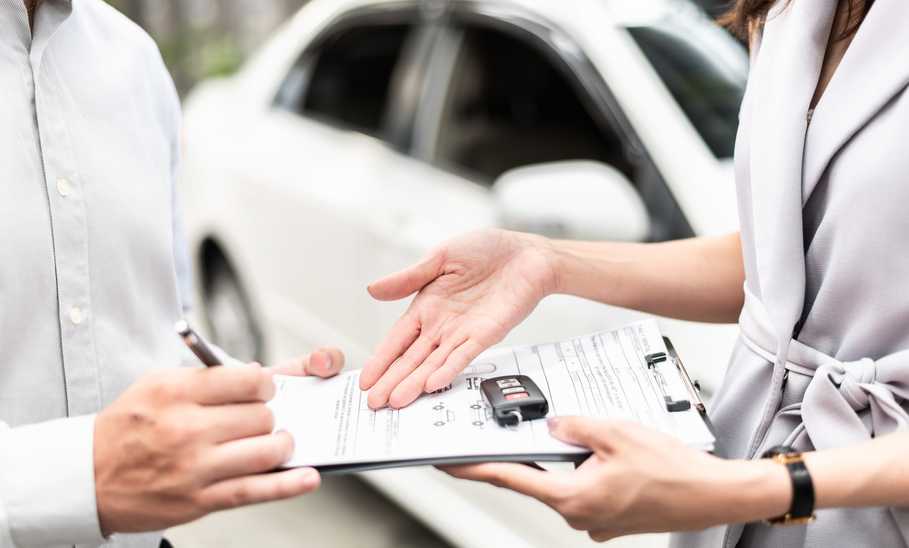How to Cancel Car Insurance in 4 Simple Steps

Our evaluations and opinions are not influenced by our advertising relationships, but we may earn a commission from our partners’ links. This content is created by TIME Stamped, under TIME’s direction and produced in accordance with TIME’s editorial guidelines and overseen by TIME’s editorial staff. Learn more about it.
Canceling a car insurance policy is very common. It’s also a relatively simple thing to do. Follow our step-by-step instructions while avoiding any of the pitfalls associated with canceling.
You'll need to follow a few simple steps to cancel your car insurance policy. Be aware that the exact process may vary by insurance company, so be sure to ask (and do) what yours requires. Typically you’ll need to:
Check your insurance ID card, policy paperwork, or the insurance company’s website for contact information. If you use a local insurance agent, you can contact their office to make the request.
Once you’re talking to your insurer or agent, explain that you need to cancel the policy. Ask what they need you to do and what (if any) fee you’ll be charged. Insurers sometimes charge a fee if you cancel a policy before the end of its term, so you may want to factor that into your decision to cancel.
Your insurance company will ask you for a signature on a form that confirms your policy cancellation request. While some companies may still mail their cancellation forms, most use email or a fully electronic form that you can e-sign. Be sure to read the form carefully, sign it, and return it as soon as possible.
After the insurance company receives your signed form, it will confirm your cancellation by mail. Keep this letter with your insurance paperwork.
If you’re owed a refund, the insurer might send you a check or apply funds to your credit card.
While canceling car insurance is a reasonably straightforward process, there are a couple of things you should avoid doing. They include the following:
It’s tempting to think that you can just stop paying your car insurance bill to have your policy canceled. But there are some good reasons not to do this.
The first reason is that, from the insurance company’s point of view, you'll seem like a customer with a missed payment rather than one who wants to cancel. They’ll keep the policy in force for a “grace period” of 10 to 20 days after the payment due date. After that period is over, they’ll cancel the policy for non-payment.
The catch is that the insurance company will still expect you to pay for coverage during the grace period. Even when you’re no longer a customer, the fact that you owe money will live on somewhere in the insurer’s databases. And if you ever try to buy a policy from that company in the future, you can expect them to charge you for those days of coverage.
The second reason is that when the insurance company cancels your policy for non-payment, it may report you to the state as an uninsured driver. This could cause some issues if you get pulled over for a traffic violation or try to renew your vehicle’s registration.
Let’s say you contact your agent after office hours and leave a voicemail requesting policy cancellation. Don't assume the policy is then canceled until you hear back from the agent, complete any other necessary steps, and receive final notification that your request has been processed and your policy is, indeed, no longer in force.
If you’re switching insurance companies, pay close attention to the date and time the old policy is set to cancel. Make sure you have new coverage on or before that moment to avoid a gap between the two policies that could put you at legal and financial risk.
For example, say your old policy is set to cancel on Jan. 30 at 12:01 a.m. You'll need to ensure your new policy is either already in force or is set to go into force at that same date and time.
A longer gap between policies—especially if you cancel without having a new policy in place—may cost you down the road. Insurers don’t like to see long coverage lapses and may classify you as a high-risk driver when you do buy a new policy. Such a classification would lead to a higher insurance premium.
You pay for car insurance up front—either as a lump sum when you buy the policy or in installments over the course of your policy term. The insurance company will likely owe you a refund when you cancel, though a cancellation fee may offset that refund.
For example, say you buy a 12-month car insurance policy for $800 and pay the lump sum. Three months later, you decide to cancel. That means three-quarters of the policy term you paid for hasn't yet happened, so your refund should equal $600 (three-quarters of $800). If the company charges a cancellation fee of 10%, it will subtract $60 from your refund. So you’d receive a refund check for $540.
You can cancel your car insurance policy any time during its term—there is no designated cancellation period. And there are many reasons why you may want to cancel.
The cost of car insurance can differ by hundreds of dollars between companies, meaning you can possibly save a lot of money by shopping around. Insurance experts recommend shopping every year or two.
It’s also a good idea to shop around when any of the following happen:
Every state has different insurance requirements. So, if you move out of state, you'll need to cancel your old policy and buy a new one. A company such as Liberty Mutual, which sells in all 50 states, can help you get set up with a new policy and agent.
Insurance companies are often far from perfect. In fact, overall car insurer customer satisfaction saw its largest year-over-year decrease, according to the J.D. Power 2023 U.S. Auto Insurance Study. If you've had it with your company's claims service, billing practices, policy rules, or other offerings, you might consider letting your wallet do the talking.
It’s no secret that millennials are less likely to drive than older generations. The no-driving trend seems to be continuing with Gen Z as well. With the cost of cars, maintenance, and fuel all rising sharply in recent years, relying on public transportation, rideshare, and your own power to get around might not be a bad idea.
While there are some good reasons to cancel car insurance, there are also some important reasons why you shouldn’t. Consider the following and what you should do instead:
There’s no doubt about it: Car insurance is getting increasingly expensive. According to The Zebra, the average cost of a policy rose from $1,483 to $1,529 in 2022.
Car insurance may be eating up a bigger and bigger part of your budget. But it's not something you should cancel, as it provides essential financial protection while you're on the road.
What to do instead: There are many ways to save on car insurance. Most companies offer generous discounts to customers who “bundle” their car and homeowners or renters coverage, meaning they get both policies from the same company. Ask your insurer if they offer this and other discounts.
Perhaps you store a car because you drive it only seasonally or because your job or military service takes you overseas. Even if you won’t be driving for a while, you should keep your car insurance to protect yourself financially if the car is damaged or stolen. Some commercial storage facilities may also require insurance. And if you finance the car with a loan or lease, your lender will likely require coverage to protect the vehicle from theft or damage.
What to do instead: Contact your insurance company or agent to see if they offer special coverage options for stored vehicles. You may be able to reduce your policy to comprehensive-only, which would protect you financially if your car is stolen or damaged while in storage. Just be sure to have liability and any other state-required coverages added back to your policy when you remove the car from storage.
Maybe remote work or a job change has lessened the amount you drive. It might be tempting to cancel your insurance. But hold on as car insurance is mandatory in nearly every state. Canceling means you'd be breaking the law every time you do drive.
What to do instead: Find out if your insurer offers programs such as usage-based insurance (UBI) or pay-per-mile. These are designed to help people who drive less than average save money. Liberty Mutual’s RightTrack UBI program, for example, offers savings of up to 30% of the cost of a regular policy.
Are you wondering if you can cancel your personal insurance policy if you drive a company car? It depends on your company’s policy. Your employer’s car insurance policy should list you as a driver and provide coverage for when you’re driving on behalf of the company. A gray area is using the company car for personal use, such as on weekends.
Ask your employer if their policy allows or excludes personal use of the vehicle. If personal use is excluded, you should have a car insurance policy of your own.
There are many good reasons to cancel a car insurance policy (and many reasons why you shouldn’t cancel). And the cancellation process is relatively straightforward. Just make sure to consider any pitfalls first. Your insurance company or agent can help.
Because you pay for car insurance coverage up front (either as a lump sum for the entire policy term, or in installments), you may be owed a refund depending on when you cancel. Note that your insurer's cancellation fee may offset this refund.
Depending on your reason for canceling, the insurance company may try to "save" your business. For example, you might be forwarded to a representative who will review your policy and try to identify discounts you’re eligible for but not using. It might be worth your while to hear them out.
If you really want to cancel in such a situation, a firm and repeated “no, thank you” should get you what you want. Remember that you have the right to cancel your policy at any time.
Regardless of whether you drive a personal car or a company car, you need to be insured. Ideally, your employer's insurance covers you when you drive a company car. If their policy covers personal use of the vehicle (such as driving it on weekends), then you may be able to cancel your personal car insurance policy. However, this is a scenario you should discuss with your employer's insurance provider or your insurance agent.
The best way to cancel a car insurance policy is by contacting your insurance company or agent. They’ll typically ask you to confirm your request by signing a cancellation form and will notify you once the cancellation is complete.
Some companies charge a fee to cancel a car insurance policy. It’s a good idea to ask about this when you cancel and factor the fee into your cancellation calculations.
The information presented here is created by TIME Stamped and overseen by TIME editorial staff. To learn more, see our About Us page.



